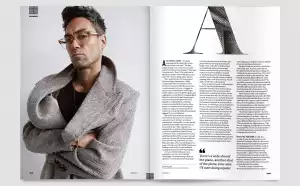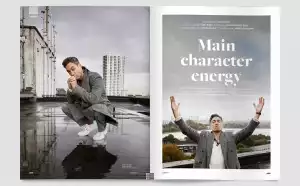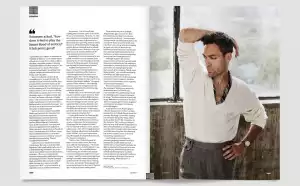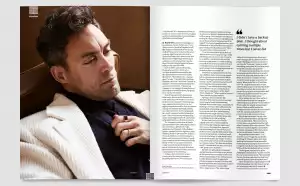Alex Hassell Grins. “It is quite amusing that the third shot of the entire show is my arse.” The shot comes during a sex scene in a Concorde toilet. Hassell had been prepped. “They told me quite early: ‘There’s this wide shot of the plane; another shot of the plane; your arse.’ OK – I’ll start doing some squats!”
Thus begins Rivals, the long-awaited and much-hyped adaptation of Jilly Cooper’s blockbuster 1988 novel. Set in the fictional county of Rutshire, the story revolves around the power struggle (or rivalry, if you will) between millionaire media magnet Lord Tony Baddingham and millionaire Tory MP Rupert Campbell-Black, the latter a former Olympic showjumper and one of literature’s great lotharios. Hassell is Campbell-Black, a role that crowns a remarkable few years in which he has risen from respected but largely unknown stage actor to playing the de-facto lead in what will surely be among the biggest TV shows of the year.
We shall return to Rupert, Rutshire and Rivals in due course. For now, let us consider Hassell. We meet in a North London pub – technically, we meet outside a North London coffee shop and relocate to the pub as the coffee shop was too crowded. Were we channelling Cooper, our rendezvous would have taken place at a members’ club, or a Royal Ascot box, but while Hassell does a fine arrogant bastard on screen, the real-life version couldn’t be more self-effacing. Hence why we’re on lime and sodas rather than Bollinger and caviar. (I’m not sure The World’s End serves Bollinger and caviar. It could probably manage prosecco and pork scratchings.)
An hour with Hassell passes very enjoyably, even if it isn’t fuelled by champagne. He seems younger than his 44 years, a combination of good genetics and a boyish enthusiasm for things and people that is extremely endearing. He laughs often, and talks with disarming equanimity about the triumphs and disasters that inevitably come with his chosen profession. I doubt he answers to ‘No-Hassle Hassell’ but the nickname would fit nicely. Take his response to Rivals opening with a shot of his bottom. “It’s all right, isn’t it? We’ve all got them.”
If you recognise Hassell, it will probably be for The Boys: he played doomed superhero Translucent in the first season. Being exploded in the second episode is unfortunate; spending 90% of your screen-time invisible does feel a bit like salt in the wound. The Boys is now a veritable franchise and, at the time of writing, by far the most likely reason for people to stop Hassell on the street. “Even though it was a small part,” he says, “and I spent most of it wearing a big green condom on my head.” (To CGI the character’s invisibility, not because the costume department had gone insane.)
Recent notable credits include Vicious in the ill-fated, live-action anime Cowboy Bebop, Ross in Joel Coen’s The Tragedy of Macbeth, and Metatron in the final season of His Dark Materials. Before his screen career took off, he did a stint at the Royal Shakespeare Company, playing Hal and Henry V to widespread acclaim. Before the RSC, he co-founded Factory, an experimental theatre group whose guerilla productions included a Hamlet where the cast were randomly assigned their roles each night and a Chekhov in which nobody rehearsed any lines whatsoever.
He didn’t walk out of drama school into a West End show, let alone a TV series or blockbuster film. He spent years eking out a living in his chosen profession. “It’s a hard road and I’ve had to claw myself up,” says Hassell cheerfully. Rivals will surely mark a career summit. “It’s possible, isn’t it?” he says when I mention the imminent spiking of his profile. “I really, really hope that loads of people will see the show. That’s very much my hope. I’d very much like to do more of it, and do it for years and years.”
Touch wood but his wish should be fulfilled. Jilly Cooper has penned 11 Rutshire novels, all of which feature Rupert in some capacity, so the content is most certainly there. So is the platform, with Rivals streaming on Disney+ and enjoying surely the most sexual content of any media released under the Disney umbrella.
“That’s fair,” agrees Hassell. “I haven’t watched everything on their platform but I would imagine it’s up there.” Right up there, assuming The Fox and the Hound isn’t a very different film from what I remember. “There probably are online versions,” says Hassell, laughing. “I really like the idea that there could be a Rivals ride at Disneyland.” Considering the buzz around the show, nothing can be ruled out.
Rivals was published in 1988, the second of what became known as the Rutshire Chronicles. While the first novel Riders depicted the world of competitive showjumping, Rivals revolved around an independent television station – I won’t insult your intelligence by revealing the principle subject of Polo. The books are linked by their Cotswold setting, the frequently recurring characters (especially Rupert), and the vast quantities of sex and booze consumed by those characters (primarily in the Cotswolds).
SHOP THE LOOK: Clothing: Dunhill | Trainers: Manolo Blahnik
For years, Cooper’s novels were dismissed as ‘bonkbusters’; now her propensity for subplots is compared to “Trollope or Dickens” in the London Review of Books. In a recent Times article on Rivals, the show’s executive producer Dominic Treadwell-Collins described Cooper as “the Jane Austen of our times.” Her readers are devoted and legion: according to her website, Cooper has sold more than 11m books in the UK alone.
Yet screen adaptations have been strangely scarce. A couple of 1990s TV movies and that’s basically your lot. Rest assured, Rivals more than makes up for lost time. Consider the cast: David Tennant as the scheming Lord Tony Baddingham, Aidan Turner as star TV presenter Declan O’Hara (his moustache deserves its own dressing room), a revelatory Danny Dyer as sweet, self-made millionaire Freddie Jones – and those are just the leading men. Emily Atack, Katherine Parkinson, Bella Maclean add to a veritable murderers’ row of talent that is by no means confined to the names in this paragraph.
Star of the show is Rupert Campbell-Black, and the show isn’t shy about the fact. After his Concorde copulation, Hassell emerges from the bathroom and swaggers down the aisle in slow motion, Robert Palmer’s ‘Addicted to Love’ on the soundtrack, row upon row of women ogling him with naked lust. Other characters discuss him as though he were a combination of Errol Flynn, James Hunt and Mephistopheles. His arrival into most scenes is preceded by someone breathlessly announcing, “Rupert Campbell-Black is here!”
Caitlin Moran wrote the Times article I cited above. The same article describes Rupert as “a hot, posh bastard who, due to a three-book-long redemptive arc, is also one of womankind’s most fancied fictional creations… There are whole pages on Mumsnet dedicated to middle-aged women describing their hottest Rupert Campbell-Black sexual fantasies. I cannot overstate what a sex god he is held to be by Jilly Cooper fans. “RCB”, as he’s referred to, is… vaginally totemic to millions of women.”
No pressure, I say to Hassell after reading him the above quote in the above. “It was a lot of pressure,” he grins. “Luckily the costumes are very good, the makeup’s good and every time I walk into a room, they tell all the supporting artists to swoon over me as if I’m Harry Styles.” A typically modest answer, although he later admits, “It’s quite fun to have moments when I get paid to act as if everyone thinks I’m the most gorgeous person in the room.”
Apparently in a recent interview, he was asked, “how does it feel to play the James Bond of erotica?” Hassell laughs as he tells the story. “It felt pretty good. It felt pretty good to play the James Bond of erotica!”
He didn’t envisage himself as Rupert. He hadn’t read the books but he received a breakdown of the character. “I just thought, there’s no point in me auditioning for this. I’m not going to get this part. He’s blonde, he’s blue eyed. In my mind he’s like Robert Redford.” His agents convinced him otherwise. The audition scene was Rupert’s emergence from the Concorde bathroom. He sent off the tape and forgot all about it.
Months later, he was invited to meet the producers and do another audition. There was a chemistry read with Bella Maclean, the 26-year-old actress who plays Rupert’s love interest Taggie O’Hara. “It was super important that we have a chemistry and the age gap doesn’t seem inappropriate.” Suddenly, the role was his. “I then had to get my head around why on Earth they cast me as opposed to anyone else.”
I assure him that he’s brilliant and he smiles. “Thanks so much. I mean, I feel that I’m capable of offering something as an actor. It was more the weird pressure of having to be the epitome of virility.” The first episode contains a scene, famous within Cooper lore, where Taggie discovers Rupert playing naked tennis with another man’s wife. No, that’s not a euphemism. Hassell stripped off completely and found the character in doing so.
“The first time I believed myself as Rupert was the tennis scene. Until that time, I felt like I was groping…” He checks himself. “No, that’s a terrible phrase! I was feeling around – also a terrible phrase! I was working out whether I was Rupert and how to play Rupert and believe myself as Rupert – and there was something about having to be totally naked; I had nothing to hide behind.” (In every sense.) Filming this scene, he realised, “either people will accept me as Rupert or they won’t. That felt like a really important turning point.”
The moment may cause multiple dropped wine glasses across the land but Hassell stresses there was a deeper purpose than titillation. “In every single first episode of any adult, particularly male-oriented TV show, is a pair of boobs and I find that such a cheap way of attempting to signal what kind of show you are, whatever. To make sure there was all sorts of nudity was really important. To show that we are actually exploring something here rather than being gratuitous.”
SHOP THE LOOK: Full look by Dunhill
Although Rupert is the central character, most adverts have placed David Tennant at their forefront. Not wishing to cause offence, I carefully note that Tennant and Turner are slightly higher profile than Hassell at the moment. “Much, much higher profile,” says Hassell immediately. He believes his (extremely relative) anonymity works to the show’s advantage when depicting its enigmatic antihero. “You have little idea about me as a person, so you can just see Rupert.”
What will a modern audience see? The epitome of virility or an extremely problematic man? As Hassell says, “I am literally a Tory gallivanting around this fucking massive house, dripping in privilege.” His love interest is 20 years old, an age difference confronted in the show. “She’s young enough to be your daughter,” one character tells Rupert with barely concealed disgust.
In one pivotal scene, Rupert gropes a female character, an act that is neither expected nor welcomed. Hassell found the moment shocking: “I remember reading it in the script being like, ‘Whoa, where do we go from here?’” Yet it rang true for the character. “He’s a white, privileged, powerful man with terrible judgement and ideas about his position and what people want from him. It makes total sense that he would do something like that. Obviously I in no way condone it, but in terms of storytelling, it makes sense.”
I can’t imagine a contemporary character groping someone and still be portrayed as a viable romantic lead… “Definitely not,” says Hassell. In Rivals, the 1980s is practically a character in its own right (playing alcoholic bingo with the soundtrack would get you smashed). A contemporary setting would “eradicate the whole point of doing it. You have to watch it going, ‘What the fuck?’” For Hassell, “it’s a barometer of how far we have or haven’t come in terms of casual racism, casual misogyny, sexism, classism. All of those sorts of things.”
He was raised in Essex, the youngest of four siblings. His late father was a “very down to earth Church of England vicar”; Jilly Cooper books were kept on the top shelf of the parental study but Alex never read any. Aged 12, he saw a musical in Chelmsford called Rock Nativity and “was hit by a bolt of lightning.” Fast-forward a decade and he’s graduating from the Royal Central School of Speech & Drama, ready to take over the world.
SHOP THE LOOK: Full look: AMI Paris
SHOP THE MAGAZINE: Square Mile
Only it didn’t quite work like that. He knew he wanted to be an actor, the kind of work he wanted to do, but the opportunities refused to manifest themselves. “No, I didn’t have a backup plan,” he says. “I thought about quitting multiple times but I never did.” Instead he founded a theatre company with another young actor Tim Evans. “That was my response to the feelings of powerlessness and impatience. Well, fuck you, I’m going to set up my own thing.”
That thing was Factory. Hassell and Evans were determined to focus on the work rather than the finances. There was no theatre. No costumes. The only props were supplied by the audience on the night. Everyone worked for free so turnover among the company was high, nobody was expected to turn down a paying job. As a result, everyone learned a variety of roles – there’s not much point spending weeks rehearsing a Hamlet if said Hamlet promptly leaves for a stint on Eastenders.
The inaugural production of Hamlet saw the audience play rock, paper, scissors every evening to allocate the roles. Anything could happen. A blindfolded Hamlet smashed a mirror against a pillar, sending shards of glass into the audience. Pets and children were often brought to shows, and became participants; Hassell once picked up his four-week old nephew Henry for the “what a piece of work is a man” speech. One performance at a music festival was frequently disturbed by intoxicated revellers in fancy dress and ended at four in the morning.
Perhaps the Factory ethos is best encapsulated by their promotional blurb for Julius Caesar: “We will meet at Barbican Underground station, and have an adventure. We don’t know exactly where we’ll be going. Come and find out with us.” Perhaps it’s director Tim Carroll addressing the audience ahead of a production of The Seagull: “You have all gambled £10 on a show where none of the actors have learned their lines.” Perhaps it’s Hassell himself: “There was a desire for it to be rock’n’roll.”
“I am very attracted to things that are difficult in terms of acting,” he says. “I like a challenge and I want to learn. I want to be as good as I can possibly be. And the best way to get better is to really challenge yourself. Be out of your comfort zone and try things that you are afraid you’re not good enough to do. Playing Hamlet with 30 seconds notice is very difficult.”
SHOP THE LOOK: Full look by Brunello Cucinelli
Sometimes not playing Hamlet is even more difficult. Factory’s growing renown led to a performance at a sold-out Globe Theatre. The biggest production in their history – and the audience landed Hassell with Fortinbras. He chuckles at the memory. “I was definitely thinking, ‘Why the fuck have I set up a company where I don’t get to play Hamlet all the time? That’s ridiculous!’” What would he do now? “Now I would just play Hamlet!”
Signing a contract with the RSC offered his first experience of job security, something he found simultaneously euphoric and overwhelming. Hassell admits to being more than a little addicted to the turbulent life of a jobbing actor, moving between jobs and cities, never knowing where the work might take him. “To have two and a half years in which I knew whatI was doing was kind of terrifying.”
He cites Joel Coen’s 2021 film The Tragedy of Macbeth as “potentially the most artistically validating experience” of his career. He played Ross, opposite Denzel Washington as Macbeth, Frances McDormand as Lady Macbeth and Kathryn Hunter doing typically exceptional work as the three witches. In 1999, Hassell went to the Barbican and saw Hunter in Scenes from an Execution on his very first evening as a drama student. “She blew my fucking mind!” A decade later, she directed him in a RSC production of Othello.)
Macbeth was garlanded with awards and acclaim. Hassell’s other major project of 2021 proved less successful: a live-action Netflix reimagining of the seminal anime Cowboy Bebop in which he played the villainous gangster Vicious. The show was heavily hyped ahead of release but received a tepid reception and was cancelled after a single season. “The whole show suffered from some people thinking it wasn’t enough like the anime and other people thinking it was too much like it,” says Hassell. “Everyone’s trying to make something really good. It’s just that some things hit and some things don’t.”
View on Instagram
The failure of Cowboy Bebop has caused an understandable reluctant to ponder how his life may look after the release of Rivals. “I’ve been in a number of other situations where people around me are saying, ‘Whoa, fuck! This is it!’ And then it isn’t it. I’m glad to have done all the work I’ve done and I’m enriched by all the experiences I’ve had. But it hurts when you get set up to have an expectation and it doesn’t pay off. So I’d rather keep the powder dry, if that makes sense.”
We’ve spoken for more than an hour. Hassell needs to accept an Instagram collaboration from Disney+ for the official Rivals trailer. He happily acknowledges being rubbish at social media: his Instagram mainly consists of promotional stuff, the occasional photoshoot, and premieres with his wife Emma King. King is also an actress. The pair met at drama school but didn’t get together for years afterwards. “She came to see a Factory show and we both asked for each other’s number off the same person.” They have since worked together on multiple occasions, including at RSC productions and on an episode of Cowboy Bebop.
King is thrilled about Rivals. So is Hassell’s mum: “I hope she can handle watching it!” Preview pieces have been gushing and everyone from journalists to industry insiders expect the show to be a huge hit. Alex Hassell may find himself on billboards but his outlook will not change. “In this game, one has to be quite philosophical about it all,” he says towards the end of our conversation. “Try and make the best decisions you can, but don’t beat yourself up about how things turn out.”
There should be no requirement for self-inflicted beatings. For Alex Hassell, things are turning out very nicely indeed.
Subscribe to the magazine here
Rivals is streaming now on Disney+




